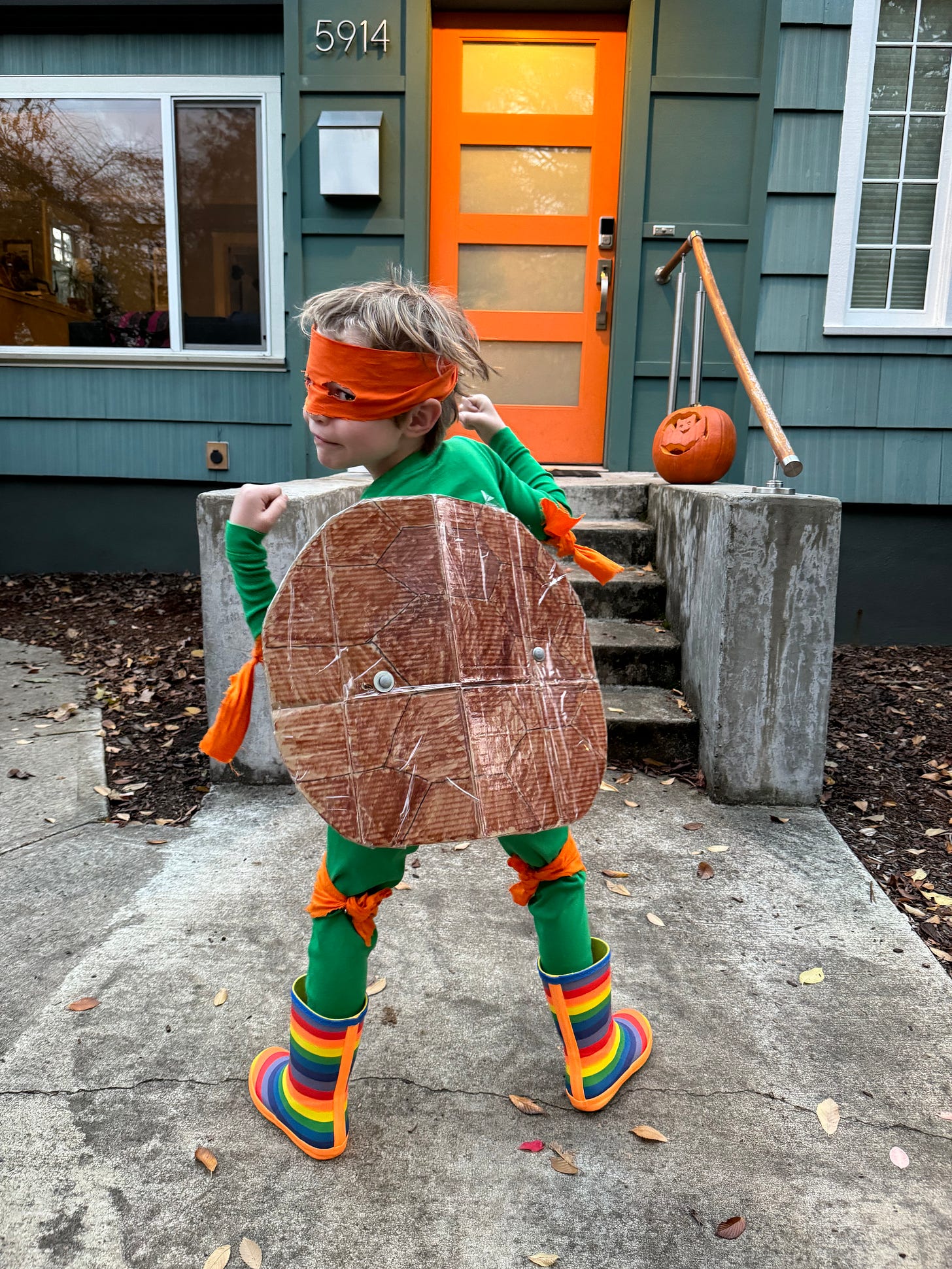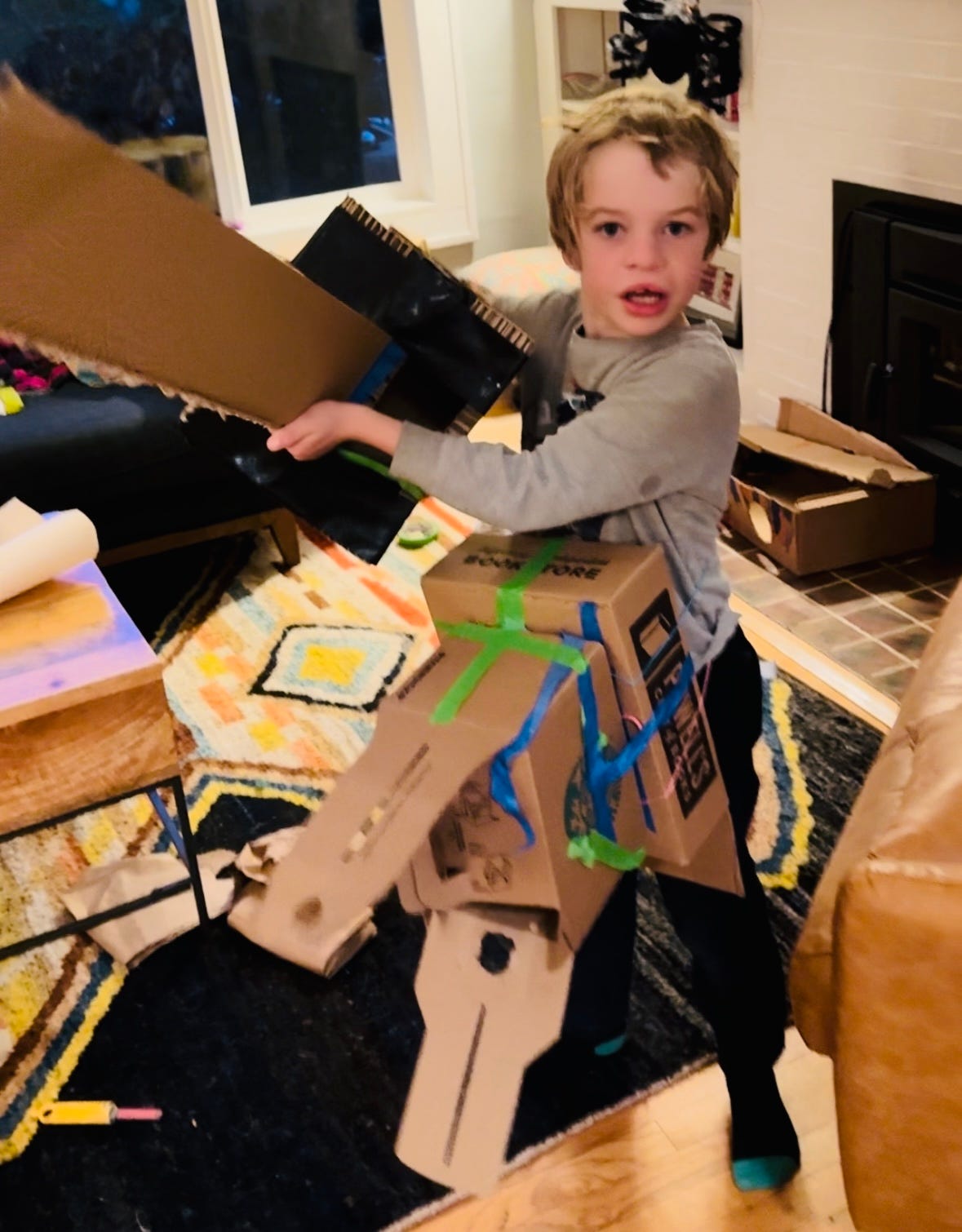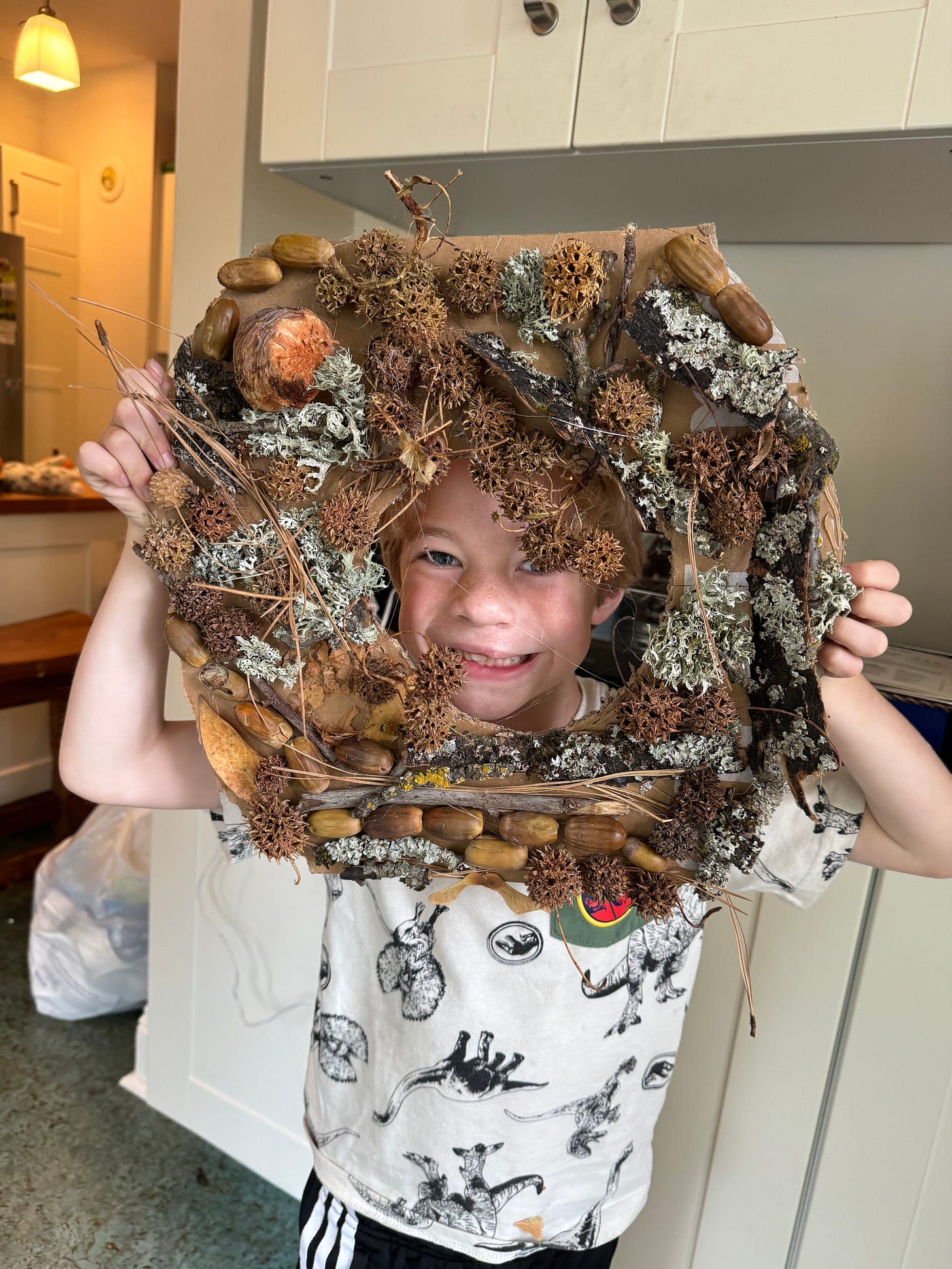The Things My Kid is Teaching Me
When I first launched this project and started writing my book proposal, I initially planned on enrolling him in some kind of scouting backwoods survival program for kids. I revised that notion pretty quickly when I realized I can barely get him to put his clothes on in the morning in time to get out the door without a fair amount of coercion and occasional bribery. But more than that, I had to come to terms that this was my journey and not his. That my anxiety cannot be misplaced and projected onto him (I wrote a bit more about that in this post).
I still wanted to involve him, though. This journey is for him after all. It’s for him and all the other kids on Earth who deserve to grow up on a just, healthy, and stable planet. And as I thought about him, I realized how much he had to teach me. That’s when I realized the key to involving him is letting him lead. His approach to the world could help me slow down and appreciate more of what’s around me.
I had intentions over the summer to spend entire days where he wasn’t in a camp just letting him lead the way. I managed to do this in bits and pieces, so not really one whole day. But I have honed in a bit more on how he approaches the world and have learned some things from him. Not just in this process, but throughout his entire six-and-a-half years.
Here are some things I’ve picked up.
Just sit and watch sometimes
The other day, I left Finch downstairs without the iPad while I went up to take a shower.
“What can I do then?” He asked me hoping I’d let him watch TV or give him back the iPad.
“Color something,” I said and went upstairs. When I left the room, he was on the couch looking out the window.
When I came back downstairs he was in the exact same place: leaning over the back of the couch staring out the window. I went up and took the position next to him observing the nearly bare elms out front with the yellow leaves scattering around our sidewalk.
“What are you looking at?” I asked him.
“The squirrel. It was digging a hole,” he said.
He went on to tell me that he had been watching it for awhile and that it buried something in the hole. We talked for a while about squirrels and why they might bury things and other animals in the winter. It was probably the best moment of the day.
This position of stillness is not one my kid is often in. He’s similar to me in that he needs to be doing something with his hands and body. But he’s still a kid that hasn’t been sucked into the addictive lure of social media and still finds things out in the world fascinating. When I actually take a moment and see what he’s looking at, follow his line of questioning, and internalize that curiosity I feel more connected to the place I’m in.
There’s opportunity in every piece of garbage
There is nothing more exciting to my child than an empty cardboard box. “This is for my costume!” is what Finch will say. Because of this, our living room looks like we’re on the precipice of moving with the stacks of boxes ready to be made into something.
Currently he’s making a Deadly Nadder dragon costume for next Halloween (yes, next Halloween). Parents of dragon-loving children will know the Deadly Nadder is a type of dragon from “How To Train Your Dragon,” specifically Astrid’s dragon. Before the Deadly Nadder, it was the Ninja Turtle costume and before that was a Transformers costume.
My point is, the kid can make any piece of garbage into something cool in his eyes. Any toilet paper roll that gets tossed in the recycling usually ends up in his pile of materials. He’ll always ask if he can use the cans in the recycling for a “project.” His creativity sees possibility in everything.
It reminds me of my time as a Peace Corps Volunteer in Malawi and how my local counterparts and Peace Corps trainers would constantly instruct, “we must use the locally available resources.” Certainly a part of that is because of necessity. Most Malawians have been left out of the global economy and have no choice but to use “locally available resources.” Malawian kids were especially ingenious when using these materials. In rural Malawi, soccer balls were hard to come by, so they used old plastic bags and twine to make perfectly decent balls to kick around. Rural Malawian kids didn’t have toy stores nearby (or money to buy those toys) so they used wires and old metal pieces to create toys like the car depicted in this lovely book called “Galimoto.”
These kids aren’t necessarily thinking of conservation, rather they’re thinking of the value of each and every object. They’re driven by seeing beyond what a thing is to what it could be.
Don’t be afraid to ask questions
On our walks home from school it seems like Finch is pelting me with a barrage of questions: “What does X mean, Mommy?” “Why did this person do that?” “What were you talking about when you said X last night?”
It’s lovely to see how his brain is working and processing and trying to figure out the world. But the older we get, the harder it is to ask questions even if we don’t know what’s going on. Sure, we know more. But we don’t and can’t know everything, we just don’t want to look like we don’t know everything, so it’s hard to ask questions that might seem too simple or basic.
I think we need to draw on that inquisitiveness and that curiosity in the same way that our kids do so that we can be informed so that we don’t jump to conclusions so that we can make decisions based on knowledge. It’s important to acknowledge what we don’t know so that we can find ways to fill in that gap in understanding or knowledge. It doesn’t mean the answers are always going to be simple and straightforward like defining a word or phrase. But it does mean that there’s movement toward greater understanding of a skill, a person, and a situation.
Use your imagination
You leave Finch alone in the living room for enough time and you’ll eventually start hearing some car sounds coming from his mouth, or heavy pounding from his feet pounding as he “fights bad guys,” or cute six-year-old voice talking through some kind of dragon-riding scenario.
In those moments, my husband and I will peek slowly into the room just to watch. These are my favorite moments because he’s lost in a different world. I envy him in those moments because the only times I’m able to do that is when I’m deep in a page-turning novel or engrossed in a favorite show. Something happens to the adult brain where play becomes so much harder to do or needs to be facilitated in some way (by way of a sport or a game or a dance class).
There’s something just so pure about how a kid can just lose themselves in a different world with nothing more than their body and brain. While I still haven’t gotten completely lost in an unfacilitated activity with just my brain and body, I have internalized some of my son’s interests and made them my own. His obsession with dragons made me open to reading about them and now I’m deep into a (very not-kid appropriate) series about dragons and dragon riders. His imagination has encouraged me to get deeper into science fiction where some of the books that have made their emotional mark on me the most the last year fall into that speculative category. Some of that I owe to this project, but a lot of it I owe to the kid for opening my mind.
I also suggest on the encouraging play front, the Substack Remembering Playby my dear friend Serena Burmanwhere she writes about play and she offers “homework” for all of us adults out there needing to tap into that childlike part of us.
I think we take some of our kids’ actions and interests for granted sometimes. It’s easy to do when you’re trying to feed them (which apparently we need to do every freaking day, multiple times a day), but if we slow down enough to pay close attention, they can definitely teach us something.
They can teach us to pay attention, to tune out the noise, and to be where you are in that moment. They are in-the-moment and that holds the key to the attention we pay to our surroundings and to what matters.
Alas, I should probably remember this the next time I’m trying very hard to keep my cool asking him for the millionth time to put on his shoes so we can get out the door.






Thanks for the shoutout!
I love all of this so much. Early Covid we weren’t buying anything and it’s ridiculous how much more creative I became.
“Just watch” & “ask lost of questions” seem especially valuable in this era of personal-takes-over-nuance.